REPORT SIP 22























About the College of Business at Illinois State University College of Business Vision, Mission, and Goals
Overarching Principles of the College of Business Standards of Professional Behavior and Ethical Conduct in the COB Diversity Programs in the College of Business Ethics in the College of Business University Commitment Advisory Board Actions

Scholarship in the College of Business (2020 - 2022) The Principles in Action (2020 - 2021) Department Level Activities
• Department of Accounting
• Department of Finance, Insurance, and Law
• Department of Management and Quantitative Methods
• Department of Marketing
• Center and Institute Activity
• Hagge Innovation Institute
• Katie School of Insurance and Risk Management
• George R. and Martha Means Center for Entrepreneurial Studies
• Varner International Business institute
Assessment of Objectives, 2018 – 2020
Objective 1: Future Objectives, 2020 - 2022
Appendix A: College of Business Publications Articles
College of Business Office of the Dean
Campus Box 5500 Normal, IL 61790-5500 Phone: (309) 438-2251 Fax: (309) 438-5510
October 1, 2022
Illinois State University signed our original letter of commitment to the Principles for Responsible Management Education (PRME) on February 4, 2008. At the time, Illinois State University, through the College of Business became the third public university in the United States to commit itself to the principles underling PRME, and, by extension, the UN Global Compact. The faculty of the College were eager to take part in the vital future outlined for us by the Principles and the UN’s Global Compact. Our commitment has only grown stronger in the past 14 years.
Our 2022 Sharing Information on Progress (SIP) report demonstrates our continuing commitment to the principles of PRME by both the University and the College. Illinois State is a leader in civic engagement, demonstrated by the Carnegie Elective Classification for Community Engagement. This designation honors the work that Illinois State University has done in engaging students and community organization to advance learning and to improve the greater community.
The College of Business demonstrates its commitment to the principles of PRME through our curriculum, research, and student engagement. In the first SIP report, the College reported 29 peer-reviewed articles. In our 2022 SIP Report, we have documented almost 300 intellectual contributions, including 201 peer-reviewed journal articles. As a College, our research topics are often incorporated into the classroom, bringing the Principles of PRME to life for our students.
On behalf of the faculty and staff of the College of Business at Illinois State University, it is with pleasure we express the continued support from both the College and University to the continued commitment to the Principles for Responsible Management Education. We are proud of embodying these principles in our teaching and conduct. As the Redbirds of Illinois State University fly into the global world to create their legacies, they carry with them the foundations learned within our classrooms and build upon the principles within their careers.
Sincerely,
 Ajay Samant Dean, College of Business Illinois State University
Ajay Samant Dean, College of Business Illinois State University
 Ajay Samant Dean, College of Business
Ajay Samant Dean, College of Business

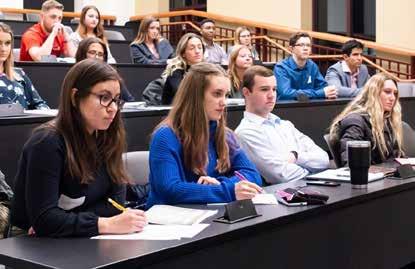
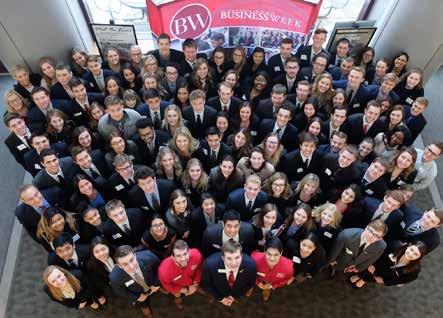




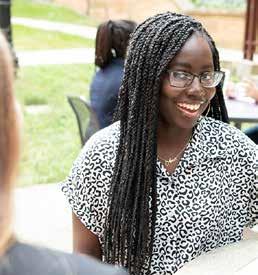



The COB is a FOUNDING MEMBER of the Principles for Responsible Management Education (PRME).

The COB is recognized by the University Sales Education Foundation as a Top University Sales Program and only 1 of 68 universities to offer a specialized undergrad program in professional sales.

The COB is 1 of 19 universities to receive full membership in the University Sales Center Alliance.
AACSB STUDENT ORGANIZATIONS COB REGISTERED Total RSO’s in the COB
was extended through 2026 to the COB after a successful continuous improvement review in 2021. AACSB Accreditation for both the COB and the numbers COB BY THE POINTS OF PRIDE 2021-2022 Exam CERTIFIED ACCOUNTANT BESTILLINOIS IN
Department.

The • 4 faculty serve as journal editors • 13 faculty serve on editorial boards • 72 faculty serve as journal reviewers • 120 finalized publications • 53 refereed journal articles • 33 refereed presentations
COB is ranked as a TOP INSURANCE AND RISK MANAGEMENT PROGRAM in the U.S. and as a top school for graduates by the Risk and Insurance Management Society and the International Risk Management Institute, Inc. . FACULTY Research THE HIGHEST PASS RATES ILLINOIS ON THE CPA EXAM The COB ranked nationally in the TOP 5 schools on each of the 4 parts of the CPA exam* *for the 64 schools reporting 50+ students taking exam
Our mission is who we are, who we serve, and why we exist. We strive to achieve our vision. Our core values are the foundation for determining our goals and strategies. Our tactics provide direction for implementing our strategies. We recognize an ever changing external environment and we will continue to monitor and assess the needs of our stakeholders in the future.
To be the first choice for business education in Illinois and beyond.
Within Illinois State University’s College of Business, through our shared commitment to excellence in learning, we prepare students to become skilled business professionals who think critically, behave ethically, and make significant contributions to organizations, communities, and our global society.
• We value excellence in instruction and enhanced student learning through a holistic approach.
• We value a dedication to knowledge creation through scholarship, teaching and service.
• We value balanced excellence between teaching and research.
• We value a culture of diversity and inclusion.
• We value a commitment to civic engagement and social responsibility to our institution, state, nation, and global community.
• We value the efficient and effective use of our resources, recognizing the fiscal challenges in higher education.
• We value a culture of shared governance.
• We value responsibility, honesty, trust, respect, and fairness as embodied in our Standards of Professional Behavior and Ethical Standards.
Prepare students for success in a diverse and global environment by providing excellent instruction and a transformative learning experience for every student.
STRATEGIES
1. Maintain high expectations for excellence in student performance.
Tactics
A. Increase standards of excellence for student performance as outlined in our department and college assessment plans.
B. Increase education across the curriculum in ethics, social responsibility, and sustainability.
C. Enhance the professionalism of our students.
D. Continue to provide an integrated and responsive curriculum with cutting edge knowledge by using outside sources (AACSB, PRiME, COB Advisory Board, etc.).
E. Monitor online education outcomes including quality of classes, quantity of classes, etc.
2. Develop a supportive, individualized, and transformative educational experience in and out of the classroom.
Tactics
A. Provide the opportunity for a transformative learning experience for every student (e.g. study abroad, internships, client projects, service learning projects, entrepreneurship opportunities, etc.)
B. Continue to offer class sizes of 30 or less in upper level courses.
C. Optimize course offerings (COB core and required major classes) to support timely graduation.
| 2018-2023
D. Continue to offer co-curricular opportunities (RSOs, guest speakers, civic engagement projects, etc.)
E. Build a strong sense of community, engagement, and satisfaction among students.
F. Increase internships and other experiential learning opportunities with high academic quality and rigor.
G. Provide and monitor opportunities for students to pursue professional certifications.
H. Monitor the number and success of students seeking and obtaining professional designations.
I. Increase the number of advisers based on AACSB recommendations.
J. Create new, distinctive and innovative classes and programs to meet the needs of stakeholders.
K. Support professionalism and career development for students.
3. Strengthen graduate programs in the College of Business.
Tactics
A. Build an MBA program with specialized tracks that differentiates itself from competitors.
B. Support opportunities for students to pursue graduate degrees.
C. Investigate new opportunities for MBA and other graduate education in the College of Business.
D. Pursue methods to encourage faculty to teach at the graduate level.
Create a workplace that encourages and rewards excellence among faculty and staff.
1. Employ an excellent faculty and staff who meet the needs of COB stakeholders.
Tactics
A. Recruit and retain high quality and diverse faculty and staff.
B. Provide adequate Graduate Assistant support to faculty.
2. Support research including contributions to practice, pedagogy, and interdisciplinary areas.
Tactics
A. Continue to provide monetary support for research by finding new funding sources.
B. Reward research through awards and recognition.
C. Partner with organizations to conduct research that is beneficial to the faculty member, the College, and the organization.
D. Provide development opportunities to build faculty expertise.
3. Support teaching excellence.
A. Continue to provide monetary support for teaching by finding new funding sources.
B. Reward teaching through awards and recognition.
C. Partner with organizations to provide opportunities such as client projects, service learning projects, guest speakers, etc.
D. Provide development opportunities to build faculty expertise.
4. Provide leading edge facilities, technology, and technology services and support for students, faculty, and staff.
Tactics
A. Maintain a building that provides a professional business setting.
B. Increase capabilities of students, faculty, and staff by ensuring evolving technologies are available to COB stakeholders.
C. Prioritize reinvestment in technology infrastructure and services.
MISSION, VISION, CORE VALUES, GOALS, STRATEGIES, AND TACTICS | 2018-2023
5. Reward excellent service through visible and meaningful awards.
Tactics
A. Provide opportunities for public recognition and awards to faculty, civil service and AP staff.
B. Seek funding for monetary awards
C. Continue to look for venues to reward excellent service
D. Seek opportunities and activities that make all COB employees feel valued and appreciated
Create an engaging and committed culture of diversity and inclusion across multiple dimensions
STRATEGIES
1. Provide opportunities that facilitate social and professional development within the college.
Tactics
A. Provide opportunities for faculty and staff development and engagement through participation in seminars, and workshops.
B. Increase opportunities for hearing and interacting with speakers invited to campus.
C. Increase welcoming and celebratory events for students, faculty, staff and other selected constituents.
2. Maintain a student body consisting of diverse, individuals with high standards and high expectations.
Tactics
A. Recruit and retain a diverse group of high-quality students.
B. Increase recruitment efforts targeting high achieving students, underrepresented students, students with financial need, and transfer students.
C. Develop programming to engage a wide spectrum of the COB student body.
D. Grow and enhance international opportunities for students and faculty.
Promote and communicate our brand including COB successes and our vision of excellence and national recognition.
STRATEGIES
1. Support and reward faculty, staff and students in striving to develop nationally recognized expertise.
Tactics
A. Encourage and reward leadership in professional organizations.
B. Support activities related to intellectual contributions such as publication in quality journals, textbooks, conference presentations, etc.
C. Increase private and federal grant research activity.
D. Prioritize funding and encouragement for faculty professional development opportunities.
2. Maintain AACSB International accreditation for business and accounting.
Tactics
A. Develop and maintain a faculty-centered assurance of learning program.
B. Develop and monitor faculty professional qualifications.
C. Develop and monitor quality and impact measures.
D. Maintain and ensure effective strategic management procedures.
E. Monitor engagement, innovation, and impact.
MISSION, VISION, CORE VALUES, GOALS, STRATEGIES, AND TACTICS | 2018-2023
3. Continue developing an effective marketing communications strategy.
Tactics
A. Increase communication inside and outside the college.
B. Create and follow a marketing and media relations plan which includes a social media strategy.
C. Create an appropriate brand for the COB within the ISU brand.
4. Encourage national and international recognition of the COB brand.
Tactics
A. Seek out opportunities for national rankings and recognitions for all degree programs.
B. Promote our centers and institutes to enhance the reputation of COB.
C. Obtain recognition for excellence through rankings and other third party information sources.
D. Obtain recognition for excellence through AACSB accreditation.
E. Promote and recognize professional activities (consulting, board service, etc.).
Create and strengthen partnerships with alumni and business organizations.
STRATEGIES
1. Continue existing and create new programs that strengthen partnerships.
Tactics
A. Create and support centers and institutes central to our mission.
B. Develop and maintain appropriate initiatives and partnerships.
2. Maintain existing and create new relationships with businesses and organizations that partner with the COB and hire our graduates.
Tactics
A. Increase opportunities for business partners to meet and interact with students.
B. Increase number of business partners who seek to interview and hire our students.
C. Increase student awareness of career options and the soft skills needed to succeed in a career.
3. Increase private financial support.
Tactics
A. Increase private giving for College priorities: scholarships, attracting and retaining faculty, databases, research, faculty development, and student development.
B. Increase the number of endowed professorships and faculty scholars.
C. Grow the COB “excellence fund” to provide support for programming central to the mission of the College of Business.
4. Maintain an active and vibrant COB Alumni network.
Tactics
A. Use social media outlets to support the COB Alumni Network.
B. Support opportunities for alumni to reconnect and become involved the life of the College.
C. Continue to refine and publish News & Views
As a signatory to the United Nation’s Principles of Responsible Management Education (PRME), the College of Business has agreed to provide reports outlining Practical Actions and Qualitative and Quantitative Results; Assessment of Outcomes; Assessment of Prior Objectives (from the 2020 SIP Report); and Future Objectives. This narrative provides specific examples related to these reported areas.

The administration, faculty, staff, and students of the College of Business at Illinois State University are committed to the principles of professional behavior and integrity. As a community of scholars and business professionals, we developed Standards of Professional Behavior and Ethical Conduct. The statement forms the basis of behavior for all stakeholders involved with the College, including all internal stakeholders such as students, faculty, and staff, and our external stakeholders such as advisory board members.





The administration, faculty, staff, and students of the College of Business at Illinois State University are committed to the principles of professional behavior and integrity. As a community of scholars and business professionals, we strive to embody the characteristics of responsibility, honesty, respect, and fairness in our professional and personal lives.
Responsibility is the foundation of integrity*. We hold ourselves and others responsible for acting with honesty, respect, and fairness.
Honesty is fundamental in learning, teaching, and research. We act honestly and do not tolerate or justify dishonest conduct in any circumstance.
Respect is the foundation of our academic community. We use appropriate speech and behaviors to demonstrate respect for one another and for the educational process.
FaiRness is essential for the evaluations that are part of the educational process. We strive to achieve fairness in our standards and procedures as well as in our evaluation of the work of others.

tRust is achieved when all who are involved in the educational process adhere to the principles of integrity.
*The American Heritage Dictionary defines integrity as the “steadfast adherence to a strict moral or ethical code.”
and staff. Take necessary and appropriate action to ensure constituents’ safety and well-being in and around the college community. ct as an advocate for faculty, staff, and students of the College of Business. Be accessible, keep appointments, and be on time in all professional settings. Practice fiscal responsibility to ensure that all expenditures fall within budget and that due process and fair bidding practices are observed. Safeguard any confidential information.
The College of Business works closely with the office of INTO. INTO has agents all over the world that identify international students who would be a good fit for ISU. INTO’s recruiters travel abroad to meet with both agents and students to educate them about our strongest programs, student life, and recreational opportunities. Once at ISU, students enroll at ISU either directly into programs of study or the Pathway Program, which allows students to continue learning the English language program wile taking appropriate content courses. Through INTO, students can begin their studies at ISU while they bring their English proficiency up to program admission standards. Without these programs, international students would not be admissible to the University. MBA and Accountancy remain two of the most popular programs for pathway students.
The College is also working to increase diversity in both students and faculty. In 2017, the College student population of underrepresented students was 21.5%. During the 2021 – 2022 academic year, the number had grown to 27.7% of the student population. Our faculty represent 20 different home countries.
In the past two years, the College, working with the University, has a GROWTH Team. This team brings professional development opportunities to the faculty and staff related to issues facing diverse populations. In addition, faculty are encouraged to attend events related to Equity, Diversity, Inclusion, and Belonging throughout the year. Multiple student organization are active in the College, including Women in Business, Accounting and Financial Women’s Alliance, Association for Cultural Unity and Mentorship (ACUMEN), Association of Latino Professionals for America, National Association of Black Accountants, Inc., and the International Business Association.
The University recognizes Diversity and Inclusion, along with Respect, as core values. The University’s commitment to EDI issues can be seen in a presidential level position for Diversity and Inclusion that was added in 2020. In 2021, the Multicultural Center opened on campus. This center provides a place of belonging and support to all students at the institution.

The College holds all stakeholders to high ethical standards. Each stakeholder is responsible to understand the Standards of Professional Behavior and Ethical Conduct which is posted on our website. As part of our College-wide assessment, students are assessed on ethical behavior.
Sustainability at Illinois State University is an evolving process which enhances quality of life and meets the economic, social, and environmental needs of the present without compromising resources for future generations. This is accomplished through teaching, research, service, and administrative efforts that benefit our various communities.
The COB utilizes many advisory boards. The College of Business Advisory board provides valuable input for the College. Additionally, each major, center, and institute meets once or twice per year with a discipline-specific advisory board. An ongoing agenda item at the board meetings are topics of social and environmental responsibility. The board members provide valuable input for an ever-evolving curriculum.
THE PRINCIPLES IN ACTION (2020 – 2021)
The College of Business continues to evolve and progress in the areas outlined by the six principles of PRME. In this section of the report, the COB outlines specific qualitative and quantitative actions and results since our last report. Related to Principle 4, the College of Business Publications can be found in Appendix A.
Diversity
• On our faculty, 52.63% have international experience. 42.11% of our faculty identify as female. We actively look to hire diverse candidates by intentionally having diverse faculty on our faculty search committees.
• We incorporate sustainability in several of our classes. For example, we review the attestation of corporate sustainability reports in our advanced audit course.
• We offer courses that prepare our students to be responsible leaders. We’ve developed a separate Ethics and Leadership for Accountants that incorporates many social responsibility dilemmas faced by accountants. We also teach International Accounting online during the summer to better facilitate access for our students.
The OFFICE OF SUSTAINABILITY at Illinois State University is one example of the commitment the University has to the Principles outlined here. The current sustainability initiatives at the University include:
• ACADEMICS AND RESEARCH
• Projects and concepts in the classrooms
• Four Majors
• Seven Minors (one in Business Environment and Sustainability housed in the College)
• CAMPUS ENVIRONMENTS
• Membership in the U.S. Green Building Council
• Protection of the ecosystem around campus
• Tree Campus Higher Education Institution
• ENERGY
• Building Metering
• LED Lighting
• Solar
• Decreased our carbon footprint by 32% since 2008
• ENVIRONMENTAL JUSTICE
• FOOD AND EVENTS
• Zero Waste Campus Events
• Composting
• Food Donations
• TRANSPORTATION
• Hybrid vehicles in the campus fleet
• Reggie Rides Bicycle Checkout Program
• WASTE REDUCTION
• Recycling
• Composting
• Reusing
• Due to COVID restrictions, we did not offer a study abroad program for 2020-2022. We will resume study abroad in Spring of 2023 to include a trip to Indonesia to provide the students with an understanding of international inclusion.
• Our BIS (BIS 362) capstone course incorporates projects to develop technology solutions for not-for-profits. Students work in teams as they would on a typical BIS engagement to provide various technology support to local not-for-profit organizations.
• WATER CONSERVATION
• Rain Gardens
• High Efficiency washing machines
• Updating systems to conserve water
•
• Several of our faculty volunteer at various local organizations. For example, one of our faculty is the treasurer and board member of The Immigration Project, a not-for-profit that provides low-cost legal and social services to immigrants.
• Accounting faculty serve as advisors, directed learning experiences and mentored student leaders in our five departmental Registered Student Organizations (RSOs). We departmentally sponsor National Association for Black Accountants (NABA), Student Accounting Society (SAS), Accounting and Financial Women’s Alliance (AFWA), the BIS Club, and Beta Alpha Psi (accounting honorary). These organizations often hold meetings and workshops on diversity, sustainability, and responsible leadership.
• Each of our student organizations hold service events that highlight the role of responsible leadership in societies.
• Leaders in our student organizations attend conferences that included responsible leadership training.
• The Department of Accounting and BIS supervises between 80 and 100 internships for academic credit per year. Students participate in internships for accounting and data analytics. These internships prepare students to be responsible leaders.
• Our advisory council meets twice a year and includes a board spectrum of firms. We look for diverse background for board members and look to them for advice of responsible and sustainable management.
• We invite external speakers to discuss various sustainability and social responsibility topics. For example, John Deere presented a workshop on sustainability issues for our students.
Our faculty have produced several research projects pertaining to ethics, sustainability, and social responsibility.
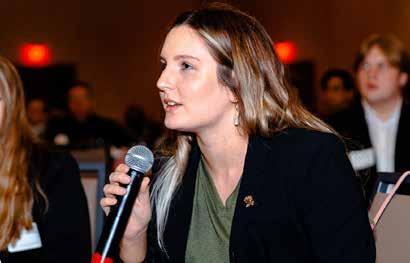
• Sankara, J., Lindberg, D. L., Young, K. (2022) Putting a Pink Collar on the Fraud Diamond. Today’s CPA. March/ April: 31-36.
• Carla, A., Olczak, W., Patten, D. (2021) Corporate Climate Change Disclosure During the Trump Administration: Evidence from Standalone CSR Reports, Accounting Forum. 45:2, 118-141, DOI: 10.1080/01559982.2021.1909819
• Olczak, W., Patten, D. (2021) Industry Norm, Legitimacy Threats, and Managerial Decision-Making: An Experimental Investigation of Environmental Capital Expenditure Projections. Accounting and the Public Interest. 21(1): 23–38.
• Beelitz, A. Cho, C. Michelon, G., Patten, D. (2021) Measuring CSR Disclosure when Assessing Stock Market Effects Accounting and the Public Interest 21(1): 1–22.
• Lao, B., McPhee, G. (2021) Internal Information Quality and CSR Reporting. Mid-year conference of the Management Accounting Section of the American Accounting Association. January 2021. Online.
The Risk Management and Insurance major at Illinois State University (ISU) is a premier, internationally known program that prepares students for careers in insurance, risk management, and financial services. According to US News & World Report in 2022, the Risk Management and Insurance (RMI) Program at Illinois State University is ranked 8th among universities offering undergraduate programs in risk management and insurance. In addition, Illinois State University is one of 33 universities around the world designated as a Global Center of Insurance Excellence by the International Insurance Society. To help students accelerate their careers in the risk management and insurance industry, ISU participates in the Collegiate Studies Program of the Institutes, which allows students earning a grade of “B” or higher in RMI courses to receive credit for corresponding Chartered Property/Casualty Underwriter (CPCU) exams. While the RMI program has three approved courses, students can receive credit for up to two CPCU exam waivers through this program.
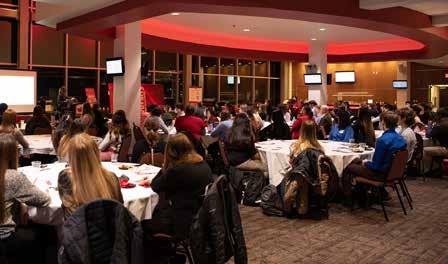
In most years, the Center for Insurance and Risk Management (also known as the Katie School) has arranged and funded six to eight students for international internships in some of the key global insurance locations including Bermuda, London, Zurich, and South Africa. These internships provide students with experiences to understand the global nature of the insurance industry and the marketplace for managing risk. While impacted by COVID during the time period of this report, it is expected that these internships will return in the summer of 2023.
Like the Redbird Career Portfolio available to ISU students in the College of Business, students in RMI engage in co-curricular activities to earn credits to receive the Certificate in Leadership and Business Acumen (CLBA). The purpose of the CLBA is to provide students with an opportunity to develop and demonstrate skills and knowledge sought after by industry employers, broadening their traditional classroom experience. Students earning the Certificate complete activities in three distinct categories:
• Category 1 involves a deep dive into a technical area of risk management or insurance that supplements the conceptual concepts presented in the classroom. Students earn credit through preparation for professional examinations or engaging in industry research projects (see Principle 4 for examples).
• Category 2 relates to cutting edge knowledge of the insurance industry through presentations or conferences, including the Annual Meeting of the Risk Management Society (RIMS), the Chicagoland Risk Form, Katie School Symposium, CPCU Society I-Day, or on-campus speakers.
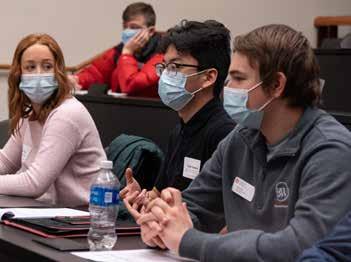
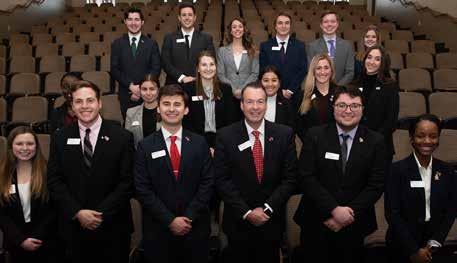
• Category 3 focuses on participation in behavioral-based events that build business acumen skills such as oral presentations, business writing, networking, team-building, negotiations, project management, and business ethics.
Financial planning and personal financial literacy have become increasingly relevant in an environment where costs of education outpace inflation and retirement risk continues to shift to employees and individuals. And as the COVID pandemic illustrates, certain groups have been more vulnerable to financial uncertainty. A financial planner or advisor can help education individuals in an effort to improve personal financial decision making and decrease financial vulnerability, which has been demonstrated to have a real impact on mental health and stress. To prepare students for careers in the industry, the FIL Department has a minor in Financial Planning. The curriculum for the Financial Planning minor was reapproved by the Certified Financial Planner (CFP) Board as a registered program. A CFP Board registered program satisfies the academic requirements to permit students to sit for the CFP exam.
FIL 380 (Ethics, Leadership, and Corporate Responsibility) discuss and analyze the role of ethics in business. The course relates ethics, stakeholder preferences including society and the environment, as well as the role of government. Special emphasis is on the evolution of ethics around the world, different cultures, and over time.

FIL offers students the transformational experience of linking theory with financial practice through two courses, each involving a student-managed portfolio of real dollars: a $900,000 portfolio of equity securities (FIL 381.06: Applied Equity Analysis, formerly FIL 370: Educational Investment Fund) and a $1,200,000 portfolio of fixed-income funds (FIL 346: Fixed-Income Security Analysis & Portfolio Management). Through these two courses undergraduate students can obtain specialized experiential learning, coupled with the small class sizes and individual attention that characterize private universities.
The Illinois State Students in Finance (ISSF) and Gamma Iota Sigma (Gamma) are registered student organizations (RSOs) open to all ISU students interested in financial services and the insurance industry respectively. These RSOs host a number of events throughout the year, including workshops, social activities, community service projects, and professional speakers to discuss current needs of industry as well as future challenges.
The ISU Innovation Consulting Community provides students with a transformational learning experience guided by project mentors with the opportunity to further develop a creative mindset to propose solutions to complex problems and innovation in strategy. Over the past two years, faculty were mentors for several projects, as well as a number of students. Results of research projects were shared in multiple ways including with the project owner, webinars, or through other means including publication in industry trade journals.
Topics over the past couple of years included:
• “Economic Costs of Racial Inequality and Injustice,” results were published in CPCU Insights in a two-part series including “Part 1 – Implications for Insurance Professionals” (by James Jones, Clinton Aboagye, Barbara Commodore, and Ernest Edem Tamekloe) and “Part 2 – Disparities in Health, Housing, and Employment” (by James Jones, Tylin Harrington, Megan Lowe, and Ernest Edem Tamekloe
• “Assessing whether telematics and usage based insurance has positive or negative impact on people of color”
• “Assessing and Mitigating Information Bias About Risks in Society”
• “Inclusive Insurance: Insurance for the Working Poor in the World”
• “Managing Climate Risks for Smallholder Farmers in Developing Countries”
The Katie School sponsors programs that provide students with opportunities to interact with professionals from the insurance industry. The opportunities include research projects, on-campus industry speakers, professional conferences, as well as additional educational programs aimed at industry partners in the insurance industry. The Katie School and RMI faculty collaborate frequently to enhance learning opportunities for students, both inside and outside of the classroom.
To provide a link between the degree programs offered within the FIL Department and professional practice, the Department has three Advisory Boards. Each Advisory Board provides separate insights to different aspects of the Department.
• The Department of Finance, Insurance and Law Advisory Board (FILAB) provides guidance on all degree programs and activities of the Department.
• The Katie School Advisory Board provides direct input on the RMI program and various co-curricular activities for all students interested in the insurance industry, including RMI major, Insurance minors, and actuarial science students.
• The Educational Investment Fund (EIF) Board of Directors provides oversight of the student managed portfolio course, as well as mentorship opportunities for students in the class. Through the EIF Board, students gain guidance and inspiration through mentorship from board members who are investment professionals, who are generally graduates of ISU.
The FIL Department houses the Institute for Financial Planning and Analysis. The mission of the Institute is to promote and cultivate financial-advising experiences for students, as well as connect students with business partners working in the financial services industry. Through the Institutes, students attend the Financial Planning Association (FPA) Annual Meeting to gain perspective of current issues in financial planning and to begin connecting with industry. In addition, over the past two years, students have participated in the FPA’s Financial Planning Challenge, a national case competition designed to engage in a holistic financial planning learning experience and develop a financial plan for a hypothetical client.
The Katie School sponsors programs that provide students with opportunities to interact with professionals from the risk management and insurance industry. The opportunities include research projects, on-campus industry speakers including an annual Risk Manager in Residence, professional conferences, as well as additional educational programs aimed at industry partners in the insurance industry. Some of the events include:
• Annual symposium bringing together industry professionals and students to discuss emerging topics in the financial services and insurance industries. As an example, in 2021, Dr. Abhishek Varma, Associate Professor in Finance presented “Environmental, Social, and Governance, Sustainable Investments, and the Role of the Insurance Industry.” Similarly, Dr. Varma also wrote an article summarizing the academic work done in the ESG space to illustrate the financial implications for society. (“How Insurers and Society Can Benefit from ESG Considerations,” CPCU Insights).
• Insurance Executive Forum invites a panel of senior insurance company executives and risk managers to discuss industry market trends, organizational practices leading to profitability, and upcoming challenges facing the industry.
• London Market Study Tour is a program designed for emerging leaders from the Lloyd’s of London insurance market to learn about the US insurance market.
• The Insurance Regulators Education Foundation Program is for state regulators, financial examiners, and analysts to gain fundamental knowledge of key functions, emerging issues in regulation, and to develop critical skills in insurance company analysis.
• 31% of MQM undergraduates (BUA, IB, and MGT combined) are from historically underrepresented groups; 38% of the undergraduate population in these three majors (combined) are female.
• 1/2 of MQM tenure-line faculty are international scholars from countries including Bangladesh, China, India, Iran, and Turkey. In addition, 31.8% of the tenure-line faculty are female.
• MQM hosted one visiting scholar from the University of Wisconsin - Madison during the reporting period.
Principles 1 Purpose, 2 Values, 3 Method, 4 Research, 5 Partnership, and 6 Dialogue
The Means Center involved more than 36 Illinois State University students in its Startup Showcase.
• 26 teams submitted applications
• 10 teams earned the right to compete
Means Center support for student companies via Accelerator Program
Principles 1 Purpose, 2 Values, 3 Method, 5 Partnership, and 6 Dialogue
Since previous PRME report in 2020, the Means Center has supported 23 student companies.
Principles 1 Purpose, 2 Values, 3 Method

The OLI hosted a summer reading program, involving 9 students and 6 faculty.
Principles 5 Partnership and 6 Dialogue
• The OLI involved 13 local community members in its Leadership Fellows program
• 25 community members participated in the OLI’s Leadership Certificate Program.
Principles 1 Purpose, 2 Values, 3 Method, and 5 Partnership
• ISU’s student chapter of SHRM was awarded an Outstanding Student Chapter Merit Award.
• Our SHRM chapter received $5,000 from ADM to support professional development. These gift will fund activities beginning Fall 2022.
• COUNTRY Financial made a significant investment in scholarship funds to be awarded for the purpose of recruiting and retaining students from underrepresented groups in management degrees.
• Our Human Resources (HR) curriculum earned the SHRM Academically-Aligned Certification for the 2nd time. We earned it in 2018, and the program was re-certified in 2021. This certification allows our students the opportunity to earn their SHRM-CP certification before graduation. HR professionals whose HR curriculums were not SHRM-aligned must have 1 year of HR-related experience to sit for the exam and earn this designation. Only 113 Bachelor of Science HR programs have this designation worldwide and 104 in the US.
MQM 120: Diversity, Inclusion, and Equality in the Workforce Course

Principles 1 Purpose, 2 Values, and 3 Method MQM 120 Diversity and Inclusion in the Workplace was approved as satisfying the Social Science requirement of the General Education program, making it an elective that is available to students University-wide.
International Business major and the Carson and Iris Varner Center for International Business (VIBI)
Principles 1 Purpose, 2 Values, 3 Method, 5 Partnership, and 6 Dialogue
• VIBI provided scholarship support to 15 students.
• ISU has the only International Business major in a public university in Illinois.
• ISU is among the top 20 IB majors among public universities in the nation, according to College Choice.
• All IB majors are required to take MQM 340a15, Corporate Social Responsibility. The course also serves as an elective for other COB majors.
• VIBI continues to coordinate with the College to deliver the B.S. in International Business at Quality Leadership University in Panama City, Panama.
International Business major and the Carson and Iris Varner Center for International Business (VIBI)
Principles 1 Purpose, 2 Values, 3 Method, 5 Partnership, and 6 Dialogue
• VIBI received a federally funded grant for the Collaborative Cross-Cultural Learning to Enhance Global Problem-Solving Skills Program. This program allowed students from the COB to engage with students from Quality Leadership University in Panama City, Panama on classroom projects and other assignments. Students from ISU then visited students in Panama to further enrich their interaction and knowledge of other cultures.
Principles 1 Purpose, 2 Values, 3 Method, 5 Partnership, and 6 Dialogue
The COB had the following students enrolled in transformational study abroad experiences: International opportunities were severely limited in 2020 – 2021 due to COVID-19 restrictions.
• 7 in international internships (2021-2022)
• 9 students participated in short-term trips (2021-2022)
• 1 student studied abroad for a full academic year (2021-2022)
Principles 1 Purpose, 2 Values, 3 Method, 5 Partnership, and 6 Dialogue
MQM Partnered with the ISU Honors Program and Milner Library to host the ISU EDI Book Club where we provided financial support and organized facilitators from several disciplines across campus for book club discussion. Students read Between the World and Me by Tanihisi Coates and Caste by Isabel Wilkerson.
Principles 1 Purpose, 2 Values, 3 Method, 5 Partnership, and 6 Dialogue
MQM organized and hosted Camp COB which was designed to show students how majoring in business contributes to income equality, social justice, and generational wealth. Approximately 40 high school sophomores and juniors attended. Programming included a panel discussion with COB alumni and current ISU students, an Information Fair where students interacted with department faculty and COB registered student organizations.
MQM partnered with the Bloomington Public Library to provide a workshop on the awareness of and ways to decrease microaggressions in the workplace. Approximately 60 participants attended.
Principles 1 Purpose, 2 Values, 3 Method, 5 Partnership, and 6 Dialogue
During the reporting period, 129 students were enrolled in internships in MQM.
Principles 5 Partnership and 6 Dialogue
MQM’s Advisory Council meets twice a year. Currently, the Council is focusing on ways to incorporate more analytics and robotics into the council membership and MQM’s curriculum. Current members of the committee include alumni who work in large corporations, small companies, and who are entrepreneurial founders of their own company. One volunteer on the Advisory Council is retired from a local nonprofit; another is the Chair of the McLean County Chamber of Commerce, and two members of the Council are recent graduates. The Advisory Council is approximately 50% female and 20% people of color.
Principle 4 Research
Faculty in MQM have conducted research on industrial sustainability in the paint and auto industries, cooptation among craft brewers, ethics in the work force, employment needs in our county (McLean County, IL), knowledge transfer in transition economy firms, small and medium sized family enterprises, and emerging markets in India, Fiji, and South Korea. Faculty published journal articles in such venues as the Journal of General Management, the Journal of Entrepreneurship, the Journal of Management Studies, the Southern Journal of Business and Ethics, Labor Studies Journal, Long Range Planning, American Communist History, the Business Education Innovation Journal, the International Leadership Journal, the International Journal of Production Economics, Career Development International, Labor Law Journal, Advances in Business Research, the Journal of Career Development, the Journal of Autism and Developmental Disorders, the Journal of Information Technology Management, the Journal of Small Business Management.
One faculty received federal funding for a competitive, overhead bearing grant from the National Institute of Food and Agriculture.
In recent years our student enrollment and faculty have become more diverse. Our department strategic plan adopted in 2021 addresses inclusivity and diversity with primary goal 3: Create an engaging and committed culture of diversity and inclusion across multiple dimensions. A key tactic in pursuit of that goal is to: Pursue initiatives aimed at creating a welcoming, inclusive and supportive environment for a diverse student body, with a particular focus on the growing underrepresented minority student population.
From 2020 to 2021 the number of women enrolled in the department increased by 5% from 322 to 336, and the percentage of women in total enrollment increased from 40% to 44%. Over that same time period, the number of minority students increased by 3% from 178 to 183. The percentage of minority students in total enrollment has increased from 20% to 24% from 2019 to 2021.
Among initiatives to support diversity and inclusion are:
• The January 2021 Professional Sales Institute Advisory Board meeting highlighted diversity and inclusion initiatives at ISU and included presentations by the ISU Interim Assistant to the President for Diversity and Inclusion, as well the president of the registered student organization, Business ACUMEN, which focuses on professional development for minority students. As a result, board members expressed interest in getting their companies involved in mentoring and participating in professional development workshops for students of color.
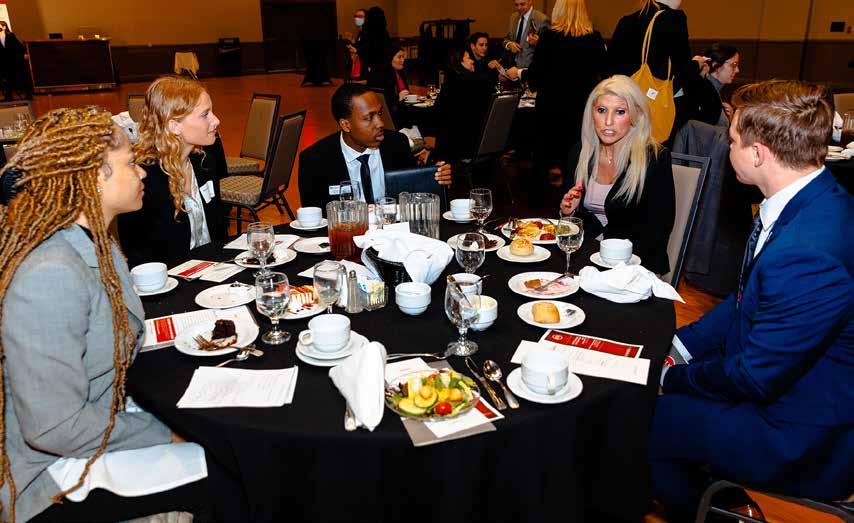
• The Paragon Marketing Group Diversity, Equity and Inclusion Scholarship is a multi-year scholarship awarded annually to support a marketing student committed to diversity and inclusion and who has an interest in sports marketing as a career. The first three-year award went to a female sophomore in 2021, and a second multi-year award was given out in 2022.
• Through experiential learning we develop capabilities of students to be future generators of sustainable value for business and society at large. As an example, students in our American Marketing Association chapter applied skills learned in their marketing courses to help local small businesses, hurt by the pandemic, to upgrade their digital marketing and boost sales during the December 2020 holiday season. The team used search engine optimization to boost leads to the business websites and worked to enhance presence on social media sites.
Every semester the Department of Marketing offers an elective entitled, Business Ethics, Corporate Social, Responsibility (MKT 236), which has as learning objectives:

1. Know terminology and apply concepts associated with business ethics, corporate social responsibility, corporate governance, and sustainability.
2. Create awareness and knowledge of recent developments in business ethics, corporate social responsibility, corporate governance, and sustainability.
3. Analyze and evaluate issues related to business ethics, corporate social responsibility, corporate governance, and sustainability.
4. Be able to identify and challenge implicit biases and inherited assumptions and ask questions to understand backgrounds and perspectives different than your own.
5. Create an individual process for making ethical decisions.
6. The instructor creates a list of companies for students to choose from to research their company’s code of ethics, ethics training, ethics officer, ethics hotline, and ethics scandals. Students also research corporate social responsibility, corporate governance and sustainability topics for their assigned company. For example, the list of companies includes Ford, General Motors, Target and Walmart.
Students discuss recent developments and analyze and evaluate issues related to those topics.
Examples of modules included in the course are:
• Stakeholders’ response to CSR
• Water Issues
• Carbon Footprint, Renewable Energy and LEED Certification
• Green Marketing and Greenwashing
• Case Analysis – The Case for Fair Trade Coffee In the academic years 2020-2021 and 2021-2022 we offered 10 sections of the course, with a total of 304 students enrolled.
Registered Student Organizations (RSOs) that are affiliated with the department provide opportunities for students to develop teamwork and leadership skills. Students in the Sales Excellence Academy work with faculty and staff to plan and implement Professional Sales Institute activities such as the Distinguished Speakers Series, Lunch and Learn events with corporate partners, the annual Golf Outing and Networking event, and sales career fairs. Executive Board members develop leadership skills in student groups such as the American Marketing Association and Sports Marketing Student Association.
Salesforce
Many of our core and advanced classes have group projects with students working in small teams to address a business problem presented by a business in our region. The teams may develop a marketing plan, promotions strategy or other deliverable such as new logo or redesigned website. The learning experiences develop teamwork, time management, and leadership skills as students apply content from their courses to solve a given business problem. An example of such student engagement is the Fall 2021 client project in the MKT 332 Creative Strategies class that created a new logo and redesigned the website for Dentsmart, a national enterprise owned by a member of our Marketing Advisory Board.
• Dr. Jeri Beggs works on a research project investigating diversity, equity, and inclusion in athletics at ISU. She also joined the diversity, equity, and inclusion committee for ISU Athletics.
• Dr. Juno Lim innovated his research class by using a publicly available database for students to discover and analyze research questions about the effects of Covid 19 on consumer behavior. The department opened a biometrics research lab in fall 2021 that enables researchers to measure reactions to stimuli through galvanic skin response, eye tracking, and facial expressions. Dr. Lim has used the equipment to measure subjects’ responses to various brand logos. In recruiting subjects for his experiments Dr. Lim used the marketing department’s student subject pool. The pool includes students from all introductory and research classes in the marketing department. Approximately 1,500 students participated in the pool in 2021, and subjects completed fifteen studies.
• Dr. Arash Zadeh is engaged in research that utilizes a Sustainalytics dataset containing corporate historical ESG scores, i.e. measures of a company’s exposure to long term environment, social and governance risks. Access to the dataset was purchased using funds provided by the Marketing department and College of Business.
Business professionals visited Marketing Analytics, Professional Sales and Integrated Marketing Communication classes to discuss current applications of marketing concepts and offer students their perspectives on opportunities and challenges in professional marketing careers.

The Marketing Advisory Board membership consists of 25 industry professionals. The Board meets twice a year to review and provide feedback on curriculum and our extra-curricular programs. Board members have been instrumental in enhancing both (1) the Professional Sales program by offering a workshop on team selling and designing a unique learning experience on selling in a social setting, and (2) the Advanced Marketing Analytics sequence by their participation as guest speakers, provision of business data sets for analysis, and sponsorship of client projects for various analytics courses.
The Department of Marketing LinkedIn group operates to strengthen partnership with alumni. As stated in the description, “It is a community built exclusively for alumni, professionals and current students of the Marketing Department at ISU, to share insight and to connect with peers who face similar challenges and goals. Our mission is to help keep everyone informed of the current state of the department and maintain a connection with the Redbird marketing family.” The LinkedIn group continues to grow and now has 559 members.
The College of Business has seven centers and institutes.
The Hagge Innovation Institute officially opened on August 16, 2022 and incorporated the Innovation Consulting Community as part of the new institute. Although the Institute has not officially completed any activities, the Innovation Consulting Community continues to be extremely active.
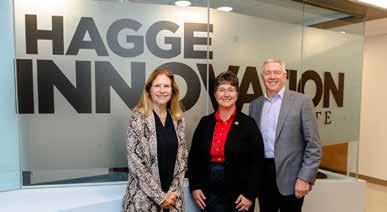
Innovation Consulting Community (ICC) is an extracurricular cross-campus, student-led, faculty-mentored consulting program that supports a wide variety of clients. Teams of students from diverse backgrounds are teamed on a project and coached by faculty or staff members.

• National Fast Food Chain: Consulting team conducted extensive research for a franchisee of a major national chain to understand how it could enhance its employees’ level of job satisfaction.

• NFL team and Community Engagement: Consulting team helped a national professional football team to foster community by proposing new educational programming in K-12 in their geographic area that would motivate kids to embrace careers in STEM.
• Home Protection: Communicating Benefits to Stakeholders: Consulting team provided a plan on how the client, a small business in IL that provides protection from flooding of basements to homeowners, could partner with insurance companies to offer its product.
• Iconic Negro Leagues Baseball Museum Fundraising: Consulting team built awareness for Negro baseball players and their legacy in the Negro Leagues and supported with strategy and creative material a substantial fundraising effort for the museum in conjunction with the U.S. Mint and others.
• From Data to a Plan: Supporting Forest Preserve of DuPage County: Consulting team developed a media plan for a state agency in IL to promote visitation to a forest preserve.
• Enhancing Diversity of those who View Wildlife: Consulting team conducted research and developed strategy for the states of Florida and Texas on how they can use digital media to more effectively reach diverse new audiences (black, hispanic, and LGBTQ).
• Health Care Communication Strategy: Building Awareness for an Interdisciplinary Approach to Orofacial Health: Consulting team completed research and developed a strategic communications plan for the non-profit International Association of Orofacial Myology Certified Orofacial Myologist (COM) Credentials. Orofacial health is the study of the muscles and skeletal structures of the mouth and face that affect speech, swallowing and/or chewing. COM’s are challenged in unprecedented ways to meet the need.
• Innovation in Grocery Retailing: Consulting team conducted research and developed new strategies for a large Midwest grocery chain on how they could better meet millennials’ needs.
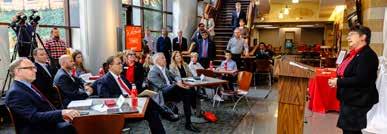
• Public Private Partnerships: How does higher education most effectively leverage resources from external organizations? Consulting team conducted research and developed strategic recommendations for the head of research at a university on how the university could better collaborate with organizations in the community.
• The Body Project: More Than Muscles Communication: Consulting team conducted research, developed strategy, and created a video for the health services unit of a major university on male attitudes toward their body image.
• Standing out as the leading provider of plant-based textiles for the circular economy: Consulting team completed research to develop creative storytelling ideas to help NFW, maker of plant based textiles, to stand out among a very crowded field of competitors in the plant-based textile movement. NFW has a unique approach to use abundant, natural materials in a truly circular way (cradle to cradle).
• Building Awareness for a New High School Global Opportunity in Illinois: Consulting team continued the development of marketing and strategy for the IL Global Scholar (IGS) program in support of the team which oversees said program. This is a state of Illinois approved project mostly supported by volunteer labor, so continuing to develop ideas for marketing and support materials is important. IL Global Scholar Program is an NGO started by high school teachers in IL who believe high school students could learn and make a difference by engaging in global issues. Deliverable was a portfolio of materials focused to support the growth of IGS and promote the value of a global perspective and a report outlining strategies for growing the IGS program using these materials.
• Modernizing Waste Management: A Case Study of a Large Owner of Apartments in the Midwest: Team completed research and proposed a detailed recycling program for a large housing complex in Chicago.
• Aridification of American Southwest and its Economic Costs: This consulting project for Verisk analyzed the growing trend of droughts throughout the American southwest, and the potential economic implications for agriculture, business, and individuals.
• Legal liability costs for use of facial recognition software: This consulting project for Verisk analyzed court cases and awards given by courts for privacy violations related to facial recognition software.
• Growing Economic Costs of riots and Civil commotion: This consulting project for Verisk analyzed trending of growing number of riots and the economic costs of these.
• Potential Economic and Insurance Implications for Solar Flares: This consulting project for Verisk analyzed the likely areas of impact, industries impacted, and potential economic costs. The student was published by Verisk for their clients.
• Assessing whether Auto Telematics and Usage Based Insurance has positive or negative impact on people of color: This consulting project for a consortium of insurance organizations analyzed the pros and cons of this type of insurance, and compared it to existing rating methodologies.
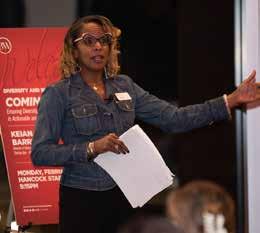
• Assessing the Cost of Racial Inequality and Injustice: This consulting project for the NAACP examined how COVID impacted students of color, and explored the various economic costs associated with racial injustice (especially from financial injustice) over time. (Two articles were published in CPCU Insights on this)
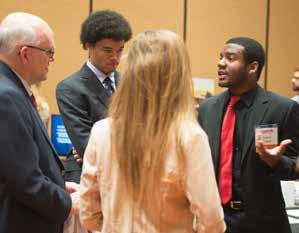
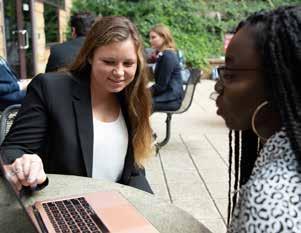
• Managing Climate Risks for Smallholder Farmers in Uganda: This consulting project for the Microinsurance Network provided an overview of the growing risks of climate change, and the implications for insurance to protect farmers. This was presented to an international audience in three languages.
• Insurance Product Development for helping to make communities more resilient to wild fires: Research conducted for A.M. Best Insurance Ratings company, was a finalist in the national competition, and presented product innovation that insurers could use to incentivize communities to become more resilient through homeowners discounts.
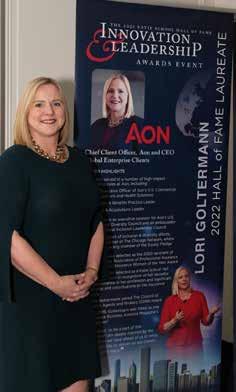
The Katie School helps to develop the capabilities of students to be future generators of sustainable value for business and society at large and to work for an inclusive and sustainable global economy in a number of ways. First through innovative curriculum development such as the creation of a new course FIL 287 on Risk in Society (available to any ISU student as an independent study) analyzing global risks such as climate change inaction, pandemics, decline in social cohesion, etc. and explore ways to assess and mitigate these risks; the creation and facilitation of ethics workshops for students on topics such as the ethical use of big data in insurance, and using big data to develop community resilience, and the creation, facilitation, and fund-raising for two week-long high school programs (one for students from underrepresented groups).
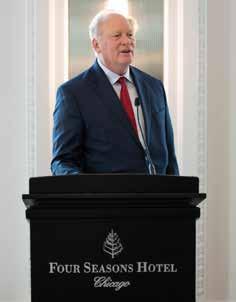
The Katie School incorporates into our academic activities, curricula, and organizational practices the values of global social responsibility as portrayed in the Katie School includes community service scholarship criteria for students seeking scholarships, through personal service of the Katie School executive director serves as an Illinois State University Civic Engagement champion, and service on Illinois State University Equity, Diversity, Inclusion Leadership Circle.
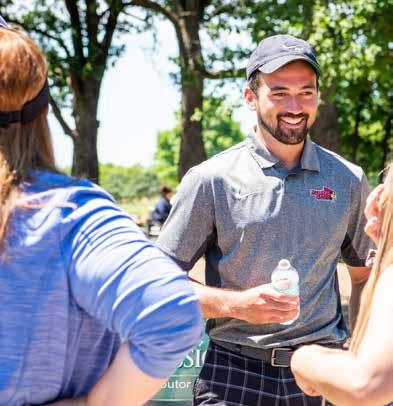
The Katie School creates educational frameworks, materials, processes, and environments that enable effective learning experiences for responsible leadership such as marketing, facilitating and fundraising for the Equity, Diversity and Inclusion event on campus which included 9 student organizations and over 150 students and 15 industry practitioners. The Katie School’s work in selecting and mentoring students for the National African American Insurance Assn student national competition on risk and insurance.
The Katie School helps both faculty, students, and industry engage in conceptual and empirical research that advances our understanding about the role, dynamics, and impact of corporations in the creation of sustainable social, environmental, and economic value. Some of the deliverables for this work included:
1. Published two articles with students on the Economic Costs of Racial Injustice and Inequality (for CPCU Insights)
2. Worked with 4 students and local NAACP organization to assess how students of color were impacted by COVID-19 remote learning restrictions.
3. Katie School Innovation Consulting Community research for client Verisk examined: a. The growing cost of racial riots over time b. The potential loss of utility company power due to southwestern U.S. droughts c. The legal and ethical implications of facial recognition software d. The Katie School Executive Director worked with faculty to research (and ultimate except for publication) examining larger social risks and the role of business and government in mitigation of risks.
The hallmark of the Katie School is its partnerships. We interact with managers of business corporations to extend our knowledge of their challenges in meeting social and environmental responsibilities jointly explore effective approaches to meeting these challenges.
1. Katie School Executive Director serves as co-chair of the CPCU Society International Ethics Committee and works with industry professionals on developing education for a wide range of ethics topics.
2. Katie School Associate Director serves on leadership team for Insurance Charitable Foundation helping to develop vulnerable communities.



3. Katie School Executive Director is Member of Microinsurance Network (for development of inclusive insurance) and serves on the climate change task force. In this capacity the Director worked with student group and five other members of the Microinsurance Network across 3 continents, to examine food security and the impact of climate change on farmers in Uganda.
4. As a way of promoting equity, the Katie School established two scholarships for promoting women in insurance.
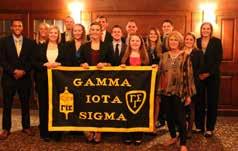
5. The Katie School sought and received grants from the Society of Actuaries, The Spencer Foundation for Risk Management, and Katie School Executive Director presents to CPCU Society annual conference on topic of Ethical use of big data in insurance.
6. The Katie School works with global insurance organizations (e.g. Lloyds of London) on topics of sustainability and ESG.

7. The Katie School partners with Griffith Foundation for Insurance Education and Insurance Regulators Educational Foundation to deliver webinars on topics such as: a. Climate change and the impact on insurance b. CSR and ESG influences on insurance company investments
We will facilitate and support dialog and debate among educators, students, business, government, consumers, media, civil society organizations and other interested groups and stakeholders on critical issues related to global social responsibility and sustainability.
1. Katie School created “deliberative dialogues” as required component of new course on Risk in Society
2. Katie School Director participated in a college podcast on homelessness
Due to COVID, we did not have a Startup showcase in 2020, but we did have one in 2021. The Means Center also hosted the Entrepreneur of the Year night.
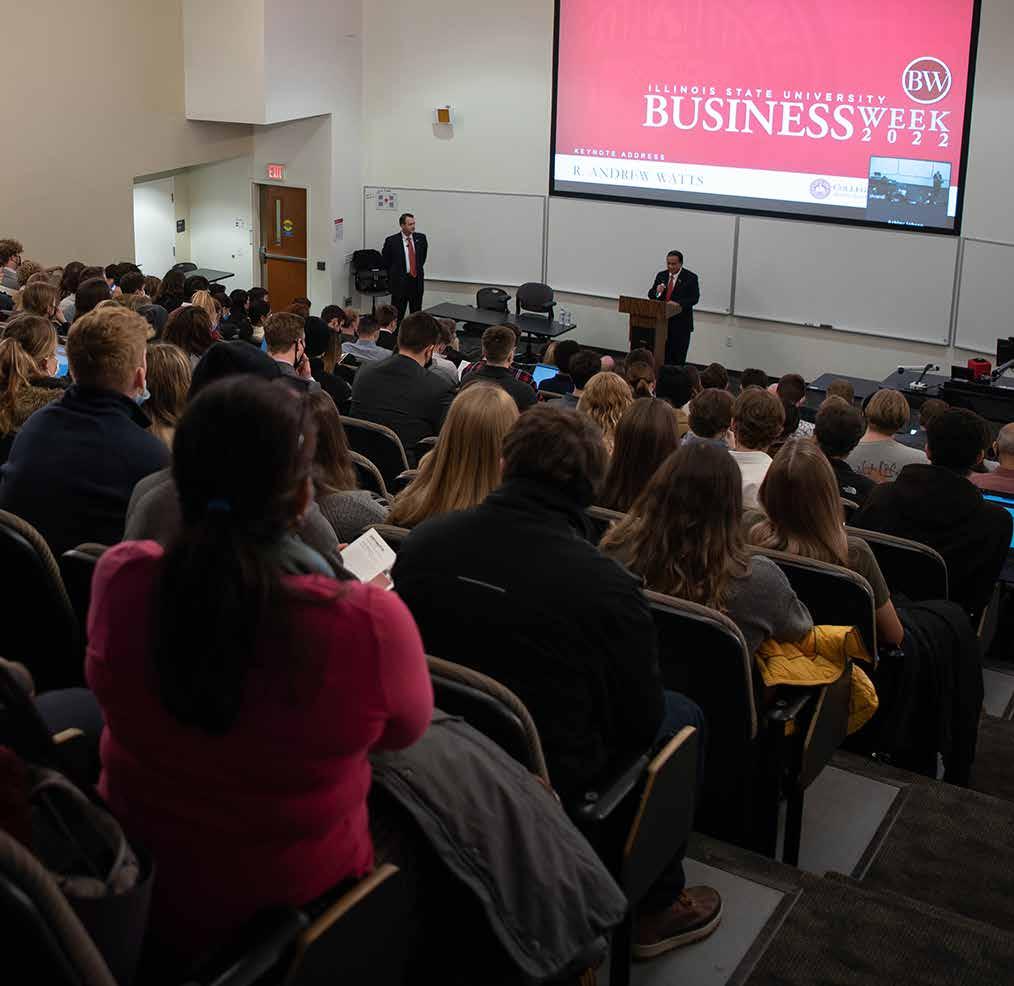
Following are the highlights:
• Before the competition, we decided to mentor the students to brush up on their presentation skills and review the slide deck. Avi Datta, Terry Noel, Terry Lowe, and Hakan Ener mentored them.
• The winner of the competition was Ashley Garett
• Konner Merrit was runner up
• Ken Myszka of Epiphany Farms was given the Entrepreneur of the Year
Economic Impact award
• Liz Florez received the Alumni of the Year award.
• President Terri Goss Kinzy, Provost Tarhule, and Associate VP of Research Craig Mclauchlan were present.
• Cocktails and food were served.
Yarger award
• Startup showcase runner Konner Merrit was given that scholarship Accelerator
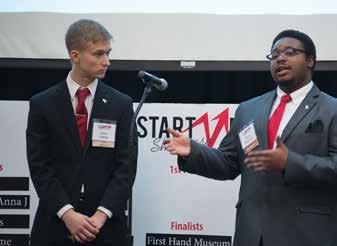
• We had a significant increase in the number of accelerator applicants
• With the help of Terry Lowe, Terry Noel, Hakan Ener, and Peter Kauffman. The winners are:
• Darci Wettstein, Sawyer Cattrell, Kyle Baruman, Linda Andersen, Regginald Brown and Evan Rousis, Bastian Hauk, and Dabby Metzler
• The Means Center GA attended every accelerator meeting for educational purposes.
To build more rigor and accountability, we have made some changes to the research awards for faculty (https://business.illinoisstate.edu/means/research/support.shtml)
1. Travel: We reimburse one research conference annually for affiliated faculty for up to $1500 when presenting a research paper.
2. Proofreading: We can reimburse the cost of proofreading a paper that will be submitted to a highly reputable journal.
3. Software: A license for STATA and Endnotes for our affiliated faculty is provided.
1. We have created stronger mentoring for students who entered the Startup showcase.
2. Accelerator winners have been mentored on acceptable funds.
3. For the startup showcase and Entrepreneur of the year night, we have moved from sit-down dinner to Hors d’oeuvres for better facilitation of dialogs.
4. We have improved the quality of judges to include people who manage venture capital and angel investing. This way, students will get better ideas about startups and corporate entrepreneurship
5. Inclusion of the VP of Research of ISU into our programs would facilitate a better understanding of Intellectual Properties and protection.
6. Our selection of judges and winners (economic impact and alumni) are all geared towards strengthening communication among students and other stakeholders.
Study Abroad in the College of Business
Principles: 1 Purpose, 2 Values, 3 Method, 5 Partnership, and 6 Dialogue
The COB had the following students enrolled in transformational study abroad experiences:
• 8 in international internships (2020-2022)
• 1 in semester-long study abroad programs (2020-2022)
• 10 in short-term trip for a grant funded Panama experience enhancing MQM 349 Cross Cultural Behavior in Business
• 1 student studied abroad for a full academic year (2021-22)
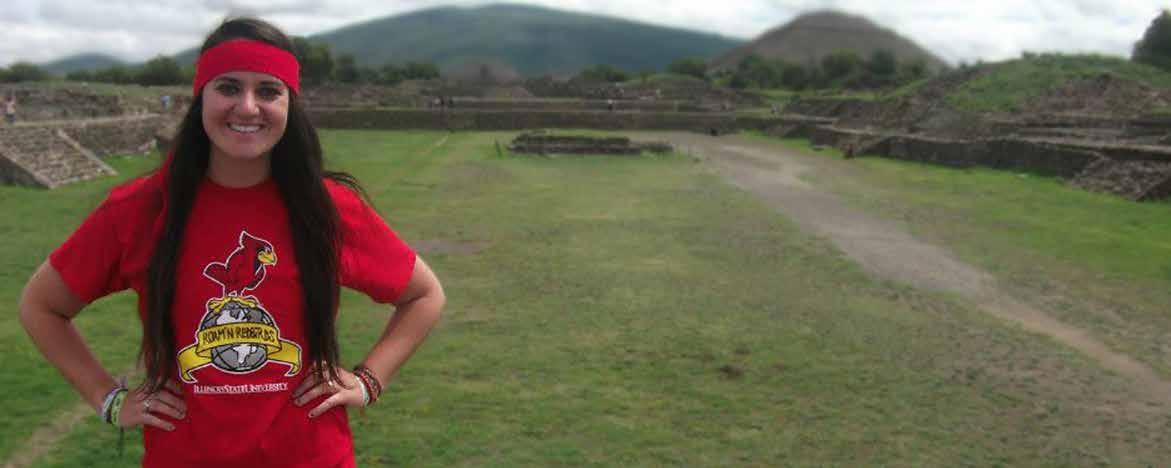
• 8 in summer study abroad programs (2020-2022)
No Faculty Led Study Abroad occurred
• COVID-19 restrictions reduced international travel opportunities during this time frame.
Principles: 1 Purpose, 2 Values, 3 Method, 5 Partnership, and 6 Dialogue
The Carson and Iris Varner International Business Institute continues to develop funding support for study abroad. As a result, scholarship support has increased to support 8-10 students studying abroad annually. The Varner International Experience Fund supports IB majors doing their required international experiences, while the Motchar Study Abroad Impact Fund supports other COB majors studying abroad. A Hatch program increased the endowment for the Varner International Experience Fund by more than $11,000 as a retirement surprise for Carson Varner in 2021.
• ISU has the only International Business major in a public university in Illinois.
• VIBI developed an IB alumni Linked In group to connect seniors with IB alums. This has provided networking opportunities and a forum for discussion about global issues on IB careers. For example, during Covid various alums shared the impacts of Covid and working from home on their organizations to help prepare students for the situation they were about to join as they graduated. This group now has 166 members which is over 10% of the IB alums. This alum network is proving helpful as a sounding board for the continued development of the IB program beyond just a connection point.
• The International Business Association, a student run organization, continues to invest in microfinance through KIVA and has made 17 loans to individuals and small organizations around the globe during this time frame.
• VIBI continues to coordinate with the College to deliver the B.S. in International Business at Quality Leadership University in Panama City, Panama with 3 cohorts having completed degrees and the fourth and fifth cohorts in progress at the present.
• VIBI cowrote a grant with Quality Leadership University in 2022 to fund student exchanges as a part of the MQM 349 course, Cross Cultural Behavior in Business. As a result, 10 students from Illinois and 3 students from Panama traveled
to visit the other institution. Also, the grant provided funds to support integrative cross cultural dialogues between students enrolled in MQM 349 at both sites to provide hands on cross cultural experiences in pairs and in teams as well as an online cultural discussion site. These hands on experiences further developed the cross cultural skills and attitudes of 56 students in these courses during Spring 2022 semester.
• VIBI has supported virtual and face to face speakers including a 40 years of the program retrospective which featured one alum from each of the decades, and virtual alum visits to various IB courses and meetings of the International Business Association.


• VIBI continues to improvise with internships to enrich student growth. In the past year students have travelled for internships in Spain, Italy, England, and Panama as well as doing virtual internships with Nigeria and Ethopia. Some students also have done domestic internships with global implications with major companies like Tesla, Enterprise, and Skai.
• Through all of these efforts, we continue to increase awareness of study abroad opportunities and improve student connections with alums through both virtual and face to face means. Though Covid presented serious obstacles, VIBI has moved effectively to use virtual connections to temporarily replace study abroad and in the long run to supplement travel while at the same time increasing resources to support travel as the globe has reopened.
In the next two years, VIBI has three specific goals:
1. Increase student travel back to the 11% of all COB graduates having at least 1 international transformational experience preCovid level and better share the experiences of those who do travel within the COB space.
2. Reinstitute face to face events with at least one internationally focused speaker each semester coming on campus.
3. Improve the COB welcome of the international students joining us each fall to empower them to enhance the global and cultural awareness of their peers.
These three goals will help VIBI increase awareness of the international opportunities available to all COB students and improve student’s ability to use cultural and global factors in business decisions by increasing global knowledge and cultural skills.
OBJECTIVE 1
General Education Approval for MQM 120, Diversity, Inclusion, and Equality in the Workforce This course was brought online in the Spring 2020 and has been offered each year in the College.
2020
1. Obtain approval for MQM 120, Diversity, Inclusion and Equality in the Workforce as a university-wide general education IDEAs (Inclusion, Diversity, Equity and Access in U.S. Society) course. 2. Increase enrollment in the Business and Environment Sustainability minor.
Increase student awareness of and participation in study abroad, internships, the Startup Showcase, and the Means Center’s Accelerator Fund.
Intertwine faculty scholarship with student learning.

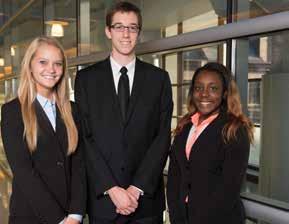
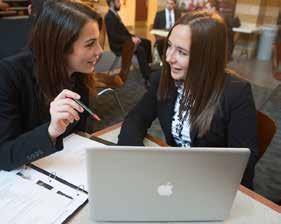
Increase underrepresented student membership, engagement, and leadership participation in Registered Student Organizations. 6. Expand faculty research activity regarding the role and impact of corporations in the creation of sustainable social, environmental and economic value.
Reinstitute face-to-face events with at least one internationally focused speaker each semester coming on campus. 8. Offer Design Thinking workshops to faculty, staff, students and community organizations on topics that have the potential to enhance community or society more generally.
Increase research and conference presentations in the area of social impact
Update the College Strategic Plan to incorporate sustainable development goals

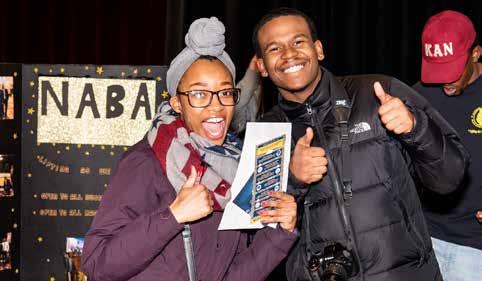

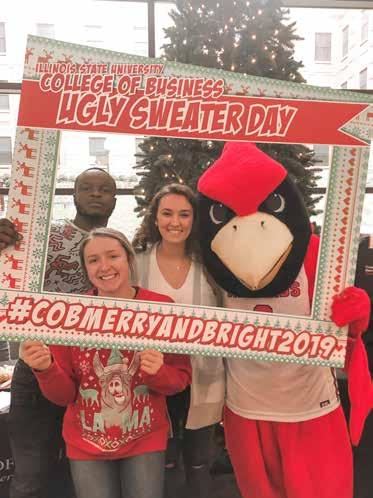

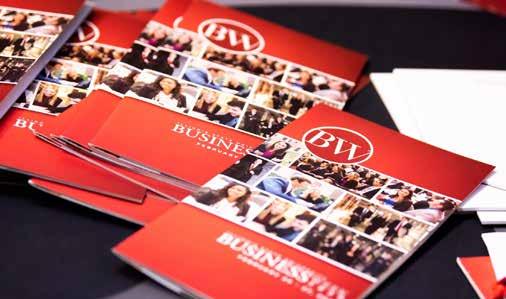

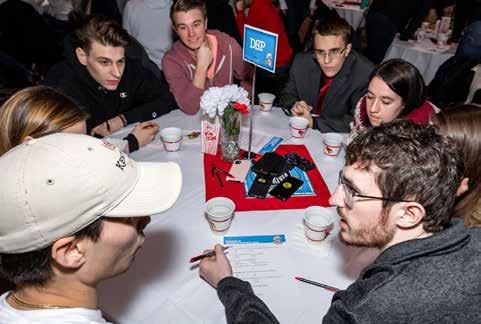
College of Business tenured and tenure-track faculty members were scholarly active during the most recent SIP period of July 1, 2020, to June 30, 2022, published . Faculty members from each department and all majors in the College of Business are represented within the research effort. Please see Appendix A for a listing of selected COB Publications.
Aggarwal, R., Midha, V., Sullivan, N. (2021). Superlatives and Scope of Improvement in Online Recommendations: Breath of Life or a Kiss of Death? MIS Quarterly, 45(3), 1411-1432. https://misq.umn.edu/superlatives-and-scope-of-improvement-in-online-recommendations-breath-of-life-or-a-kiss-of-death Agustia, D., Harymawan, I., Nowland, J. (2022). Joint Board-Management Meetings and Firm Performance. Australasian Accounting, Business and Finance Journal, 16(1), 119-133.
Aiken, A., Sherrill, E., Upton, K. (2022). Side-by-Side Management of Mutual Funds and Actively Managed Exchange Traded Funds. Financial Review, 1-25. https://doi.org/10.1111/fire.12299
Baggett, C., Cole, C., Crowley, G., Sirmans, E. T. (2020). Spillover Effects of Increased Health Insurance Enrollment on Workers’ Compensation Insurance. Risk Management and Insurance Review, 23(1), 53-74. https://onlinelibrary.wiley.com/doi/10.1111/rmir.12142
Bahl, M., Kriauciunas, A. P., Brush, T. H. (2020). How do Ownership Type and Knowledge Transfer Influence Success of Change? A Study of Transition Economy Firms. Global Strategy Journal, 10(4), 861-884.
Bahl, M., Lahiri, S. (2021). Managing Global Value Chain Triversity and Innovation Performance Using Social Mechanism. Thunderbird International Business Review, 63(5), 565-576.
Bahl, M., Lahiri, S., Mukherjee, D. (2021). Managing Internationalization and Innovation Tradeoffs in Entrepreneurial Firms: Evidence from Transition Economies. Journal Of World Business, 56(1).
Bahl, M., Lahiri, S., Mukherjee, D. (2021). Managing Internationalization and Innovation Tradeoffs in Entrepreneurial Firms: Evidence from Transition Economies. Journal Of World Business, 56(1).
Bakir, A., Bakir, N., Blodgett, J. G. (2021). Students’ Satisfaction With A Study Abroad Program. Journal of Consumer Satisfaction, Dissatisfaction and Complaining Behavior, 33(1), 46-62.
Bakir, A., Bakir, N., Blodgett, J. G. (2021). Students’ Satisfaction With A Study Abroad Program. Journal of Consumer Satisfaction, Dissatisfaction and Complaining Behavior, 33(1), 46-62.
Bakir, N., Humpherys, S., Dana, K. (2020). Students’ perceptions of challenges and solutions to face-to-face and online group work. Information Systems Education Journal, 18(5), 75-88.
Bakir, N., Phirangee, K. (2021). ZOOMing into a community: Exploring various innovative teaching practices for emergency remote teaching. Journal of Teaching and Learning with Technology, 10(1).
Bisco, J., Fier, S., Holder, A. (2021). A.M. Best Rating Outlooks and Financial Strength Rating Changes. Journal of Insurance Issues, 44(1), 1-37.
Bisco, J., Fier, S., Pooser, D. (2020). Business Interruption Insurance and COVID-19 - Coverage Issues and Public Policy Implications. Journal of Insurance Regulation, 39(5).
Black, H. G., Dingus, R., Milovic, A. (2021). From Student to Professional: Teaching Professionalism in the Marketing Classroom. Marketing Education Review, 31(1), 41-52. https://doi.org/10.1080/10528008.2020.1836974
Black, H. G., Jeseo, V. B., Vincent, L. H. (2021). Promoting Customer Engagement in Service Settings Through Identification. Journal of Services Marketing, 35(4), 473-486.
Born, P. H., Montesinos-Yufa, H. M., Sirmans, E. T. (2021). Financial Sector Growth and Annuitization: Evidence from the United States. International Review of Financial Consumers, 6(1), 35-44. https://www.iafico.org/2021-vol-6
Born, P., Hughen, L., Sirmans, E. T. (2020). The Impact of Market Power and Economies of Scale on Large Group Health Insurer Profitability. Journal of Insurance Issues, 43(2), 43-63. https://www.jstor.org/stable/26931210?seq=1
Burr, D. S., Fatigante, W. L., Lartey, J., Jang, W., Stelmack, A. R., McClurg, N. W., Standard, J., Wieland, J., Kim, J.-H., Mulligan, C., Driskell, J. D. (2020). Integrating SERS and PSI-MS with Dual Purpose Plasmonic Paper Substrates for On-Site Illicit Drug Confirmation. ANALYTICAL CHEMISTRY, 92(9), 66766683.
Burr, D. S., Fatigante, W., Lartey, J., Jang, W., Stelmack, A. R., McClurg, N., Standard, J., Wieland, J., Kim, J. H., Mulligan, C. C., Driskell, J. D. (2020). Integrating SERS and PSI-MS with Dual Purpose Plasmonic Paper Substrates for On-Site Illicit Drug Confirmation. Analytical Chemistry, 92(9), 6676-6683. doi.org/10.1021/acs.analchem.0c00562
Chaker, N., Beeler, L., Delpechitre, D. (2021). Can Customer Loyalty to a Salesperson be Harmful? Examining Customer Perceptions of Salesperson Emotional Labor Strategies Post Ethical Transgressions. Industrial Marketing Management, 96, 238-253.
Chernykh, L., Kotomin, V. (2022). Risk-based Deposit Insurance, Deposit Rates and Bank Failures: Evidence from Russia. Journal Of Banking And Finance, 138, 13 pages. https://www.sciencedirect.com/science/article/pii/S0378426622000826?via%3Dihub
Choudhury, A., Jones, J. R., Opare-Addo, M. (2020). Perceived Risk and Willingness to Provide Loan to Smallholder Farmers in Ghana. Journal of African Business, 21(1), 1-18.
Davies, R., Allen, G., Albrech, C., Bakir, N., Ball, N. (2021). Using Educational Data Mining to Identify and Analyze Student Learning Strategies in an Online Flipped Classroom. Education Sciences, 11(11), 668.
Davis, T. S., Mountjoy, K. J. (2021). Impact of Psychological Contract Violations: Stories from Educators. International Journal for Business Education, 161, 9 - 22. http://www.ijbe.online
Dayyala, N., Walstrom, K. A., Bagchi, K. (2021). Team Characteristics Moderating Effect on Software Project Completion Time. International Journal of
Information Technologies and Systems Approach (IJITSA), 14(1), 174-191. https://www.igi-global.com/
Dayyala, N., Walstrom, K. A., Bagchi, K. (2021). Team Characteristics Moderating Effect on Software Project Completion Time. International Journal of Information Technologies and Systems Approach (IJITSA), 14(1), 174-191. https://www.igi-global.com/ Dayyala, N., Zaidi, S. K. R., Bagchi, K. (2020). Diffusion of IFRS using innovation diffusion models. Emerald Publishing Limited, 28(4), 685-701. https:// www.emerald.com/insight/content/doi/10.1108/IJAIM-01-2020-0002/full/html
Delpechitre, D., Gupta, A., Zadeh, A. H., Lim, J. H., Taylor, S. A. (2020). Toward a New Perspective on Salesperson Success and Motivation: A Trifocal Framework. Journal of Personal Selling & Sales Management.
Devinatz, V. G. (2021). Before “Banana Time”: Donald Roy on Labor, Economic Activities, Unemployment Duration and Politico-Economic Attitudes of Seattle Hooverville Residents. Labor Law Journal, 72(1), 50-56.
Devinatz, V. G. (2021). The Labor Party Question: Rethinking American Exceptionalism, the CPUSA’s Role and CPUSA-Led/Influenced Trade Union Activity Circa 1936 to 1955. American Communist History, 20(1-2), 95 - 107.
Devinatz, V. G. (2022). Union Democracy, Union Bureaucracy, and the Left. 47(2), 137-148.
Dingus, R., Black, H. G. (2021). Choose your Words Carefully: An Exercise to Introduce Artificial Intelligence to the Marketing Classroom. Marketing Education Review, 31(2). https://doi.org/10.1080/10528008.2020.1843361
Downes, M., J. (2020). Antecedents and Consequences of Organizational Gendering. Journal of Business and Management Research, 13(1), 6-16. file:///Z:/Research/JournalPapers/2020_IJBMR_Issue.pdf
Downes, M., J. (2020). Antecedents and Consequences of Organizational Gendering. Journal of Business and Management Research, 13(1), 6-16. file:///Z:/Research/JournalPapers/2020_IJBMR_Issue.pdf
Elango, B., Dhandapani, K. (2020). Does Institutional Industry Context Matter to Performance? An Extension of the Institution-based View. Journal of Business Research, 115(7), 139-148.
Ener, H. (2022). How does CEO technical expertise influence licensing-out at technology ventures? Technovation, 114, 887-906. https://doi. org/10.1016/j.technovation.2022.102501
Engler, D., Cattani, G., Porac, J. (2020). Studying the Incubation of a New Product Market Through Realized and Alternative Histories. Strategy Science. Ertugrul, M., Marciukaityte, D. (2021). Labor Laws and Corporate Social Responsibility. Journal of Banking and Finance, 125, 19.
Ferris, S., Jayaraman, N., Liao, M.-Y. (2020). Better Directors or Distracted Directors? An International Analysis of Busy Boards. Global Finance Journal, 44.
Fiorito, J., Gallagher, D. G., Russell, Z. A., Thompson, K. (. (2021). Precarious work, young workers, and union-related attitudes: Distrust of employers, workplace collective efficacy, and union efficacy. Labor Studies Journal, 46, 5-32.
Galloway, T., Kuhn, K. M., Collins-Williams, M. (2021). Competitors as advisors: Coopetition among small business entrepreneurs. Long Range Planning. Galloway, T., Miller, D., Liu, C. (2021). Guilty by Association: Spillover of Regulative Violations and Repair Efforts to Alliance Partners. Journal of Business Ethics(Dec 2021), 1-14.
Good, V., Hughes, D. E., Wang, H. (2022). More than money: establishing the importance of a sense of purpose for salespeople. Journal of the Academy of Marketing Science.
Goodman, J. M., Corser, G. C., Hartman, N. S. (2021). Why commit when the future is bright? The interactive effects of future time perspective and organizational cynicism. STUDIA UNIVERSITATIS BABEȘ-BOLYAI OECONOMICA, 66(1), 1-12. https://sciendo.com/issue/subboec/66/1
Goodman, J. M., Corser, G. C., Hartman, N. S. (2021). Why commit when the future is bright? The interactive effects of future time perspective and organizational cynicism. STUDIA UNIVERSITATIS BABEȘ-BOLYAI OECONOMICA, 66(1), 1-12. https://sciendo.com/issue/subboec/66/1
Gray, S., Hall, J., Pollard, G., Cannavan, D. (2021). The public-private partnership valuation paradox. Accounting Research Journal, 34(6), 546-579. Greco, L., Walter, S., Porck, J., Scrimpshire, A., Zabinski, A. (2022). A Meta-analytic Review of Identification at Work: Relative Contribution of Team, Organizational, and Professional Identification. Journal of Applied Psychology, 107(5), 795–830.
Gupta, A., Ishida-Lambert, C. (2021). Navigating the New Normal: An S-O-R Perspective on Student Experiences of Environmental, Psychological, and Behavioral Changes during the Covid-19 Pandemic. Journal of Marketing Education. https://journals.sagepub.com/doi/full/10.1177/02734753211065124
Hartman, N. S., Conklin, T. A. (2021). Books and posters: Creating conversations that result in learning. Management Teaching Review, 6(3), 223-236.
Hartman, N. S., Karriker, J. H. (2021). Preparing managers for a reconfigured world: management education’s new gig. Journal of Management Development, 40(1), 23-34. https://doi.org/10.1108/JMD-05-2020-0164
Harymawan, I., Agustia, D., Nasih, M., Inayati, A., Nowland, J. (2020). Remuneration Committees, Executive Remuneration and Firm Performance in Indonesia. Heliyon, 6(2), e03452.
Harymawan, I., Nasih, M., Augstia, D., Ratri, M., Nowland, J. (2020). CEO & CFO Education and R&D Investment in Indonesia. Australasian Accounting Business Finance Journal, 14(2), 16-34.
Harymawan, I., Nasih, M., Nowland, J. (2021). Top Management Team Meetings and Firm Performance. Accounting Research Journal, 33(6), 691-708.
Harymawan, I., Ratri, M., Nowland, J. (2020). Assessment of Criteria for Performance Evaluation (KPKU) and Firm Performance: Evidence from Indonesia. Journal of Security & Sustainability Issues, 9(3), 1077-1088.
Hong, P. C., Hejazi, M. T., Deng, X., Jagani, S. (2022). Dynamic market complexity and service value advantage: an empirical investigation of business process management. Business process management, 28(4), 983-1004. https://www.emerald.com/insight/content/doi/10.1108/BPMJ-01-2022-0045/ full/html
Howe, T., Kotomin, V., Liao, M.-Y., Varma, A. (2020). A Tale of Two SMIPs: Equity and Fixed Income. Managerial Finance, 46(5), 636-646.
Howe, T., Kotomin, V., Liao, M.-Y., Varma, A. (2020). A Tale of Two SMIPs: Equity and Fixed Income. Managerial Finance, 46(5), 636-646.
Howe, T., Kotomin, V., Liao, M.-Y., Varma, A. (2020). A Tale of Two SMIPs: Equity and Fixed Income. Managerial Finance, 46(5), 636-646.
Howe, T., Kotomin, V., Liao, M.-Y., Varma, A. (2020). A Tale of Two SMIPs: Equity and Fixed Income. Managerial Finance, 46(5), 636-646.
Huffcutt, A. I., Howes, S. S., Dustin, S., Chmielewski, A. N., Marshall, C. A., Metzger, R. L., Gioia, V. P. (2020). Empirical assessment of typical versus maximal responding in Behavior Description Interviews. Human Performance, 33, 447-467.
Humpherys, S., Bakir, N., Babb, J. (2021). Experiential Learning to Foster Tacit Knowledge through a Role Play, Business Simulation. Journal of Education for Business.
Jawahar, J. (2020). Assessing employers’ satisfaction With Indian engineering graduates using expectancy-disconfirmation theory. International Journal of Manpower., 41(4), 473-489.
Jawahar, J. (2020). Do women and men enjoy the same benefits from job Demands in collectivistic patriarchal societies? International Journal of Manpower, 41(1), 52-67.
Jawahar, J. (2021). How does negative career feedback affect career goal disengagement? Evidence of the mediating roles of career planning and psychological well-being from Pakistan. Journal of Career Development.
Jawahar, J. (2021). Influence of return on investment and labor Market conditions on job seekers’ preferences of employment attributes in the Indian context. Journal of Asian Business & Management..
Jia, R., Steelman, Z. R., Jia, H. H. (2022). What Makes One Intrinsically Interested in IT? An Exploratory Study on Influences of Autistic Tendency and Gender in the U.S. and India. MIS Quarterly, 46(3), 1603-1634. https://misq.umn.edu/what-makes-one-intrinsically-interested-in-it-an-exploratorystudy-on-influences-of-autistic-tendency-and-gender-in-the-u-s-and-india.html
Johnston, J. (2020). Extended XBRL Tags and Financial Analysts’ Forecast Error and Dispersion. Journal of Information Systems, 34(3), 105-131.
Johnston, J., Guidry, R. P., Trimble, M. (2021). Temporal Changes in the Value Relevance of Analysts’ Forecasts. Journal of Corporate Accounting and Finance, 32(2), 7-21.
Johnston, J., Guidry, R. P., Trimble, M. (2021). Temporal Changes in the Value Relevance of Analysts’ Forecasts. Journal of Corporate Accounting and Finance, 32(2), 7-21.
Johnston, J., Guidry, R. P., Trimble, M. (2021). Temporal Changes in the Value Relevance of Analysts’ Forecasts. Journal of Corporate Accounting and Finance, 32(2), 7-21.
Johnston, J., Soileau, J. (2020). Enterprise risk management and accruals estimation error. Journal of Contemporary Accounting & Economics, 16(3), 100209. http://dx.doi.org/10.1016/j.jcae.2020.100209
Johnston, J., Zhang, J. H. (2021). Auditor Style and Financial Reporting Similarity. Journal of Information Systems, 35(1), 79-99. http://dx.doi. org/10.2308/isys-18-046
Judson, K., Aurand, T. (2021). Student Perceptions of the Flipped Classroom: An Evaluation of Hybrid Pedagogy in the Marketing Classroom. Journal of Higher Education Theory and Practice, 21(5), 13-26. https://articlegateway.com/index.php/AJM/issue/view/422
Karriker, J. H., Hartman, N. S., Cavazotte, F., Grubb III, W. L. (2021). Identity in the Gig Economy: Affect and Agency. Journal of Organizational Psychology, 27(2), 146-159.
Khalil, S. (2020). Dynamic capabilities for firm performance under the information technology governance framework. European Business Review. Khalil, S. (2020). Exploring knowledge management in agile software development organizations. International Entrepreneurship and Management Journal.
Kong, L., Lonare, G., Nart, A. (2022). Industry Tournament Incentives and Corporate Innovation Strategies. 45(1), 124-161. https://onlinelibrary.wiley. com/doi/full/10.1111/jfir.12270
Kotomin, V. (2021). The Clientele Effect around the Turn of the Year: Evidence from the Bond Markets. Journal Of Economics and Finance, 45(4), 637653. https://doi.org/10.1007/s12197-021-09550
Kotomin, V., Varma, A. (2022). Do Large Losses Loom Larger than Gains? Salience, Holding Periods, and the Disposition Effect. Financial Review, 57(2), 397-427.
Kotomin, V., Varma, A. (2022). Do Large Losses Loom Larger than Gains? Salience, Holding Periods, and the Disposition Effect. Financial Review, 57(2), 397-427.
Lahiri, S., Dhandapani, K. (2021). Project performance in emerging market: The influence of cultural distance and business group affiliation. Asia Pacific Journal of Management, 38(1), 179-209.
Lahiri, S., Karna, A., Kalabundi, S. C., Edacherian, S. (2022). Performance Implications of Outsourcing: A Meta-Analysis. Journal of Business Research, 139(February 2022), 1303-1316.
Lahiri, S., Kundu, S., Munjal, S. (2021). Processes Underlying Interfirm Cooperation. British Journal of Management, 32(1), 7-19.
Lahiri, S., Mukherjee, D., Peng, M. W. (2020). Behind the Internationalization of Family SMEs: A Strategy Tripod Synthesis. Global Strategy Journal, 10(4), 813-838. https://doi.org/10.1002/gsj.1376
Lastner, M. M., Delpechitre, D., Goad, E. A., Andzulis, J. ‘. (2020). Thank You for Being a Friend: A Peer Learning Approach to Marketing Education. Journal Of Marketing Education, 43(2), 216 - 232.
Liao, M.-Y. (2020). Corporate Governance and Delisting: Evidence from Emerging Markets. Journal of Accounting and Finance, 20(2), 178-191.
Lim, J. H., Donovan, L. A., Kaufman, P., Ishida, C. (2021). Professional Athletes’ Social Media Use and Player Performance: Evidence from the National Football League. International Journal of Sport Communication, 14(1), 33-59. https://doi.org/10.1123/ijsc.2020-0055
Lim, J. H., Donovan, L. A., Kaufman, P., Ishida, C. (2021). Professional Athletes’ Social Media Use and Player Performance: Evidence from the National Football League. International Journal of Sport Communication, 14(1), 33-59. https://doi.org/10.1123/ijsc.2020-0055
Lim, J. H., Donovan, L. A., Kaufman, P., Ishida, C. (2021). Professional Athletes’ Social Media Use and Player Performance: Evidence from the National Football League. International Journal of Sport Communication, 14(1), 33-59. https://doi.org/10.1123/ijsc.2020-0055
Lim, J. H., Rishika, R., Janakiraman, R. (2020). Competitive Effects of Front-of-Package Nutrition Labeling Adoption on Nutritional Quality: Evidence from Facts Up Front–Style Labels. Journal of Marketing, 84(6), 3-21. https://journals.sagepub.com/doi/10.1177/0022242920942563
Lindberg, D. L., Sanders, J. C., Seifert, D. L. (2021). Insuring Risks Associated with the Production and Sale of Marijuana. International Journal of Risk and Contingency Management, 10(2), 18-25.
Lindberg, D. L., Sanders, J. C., Seifert, D. L. (2021). Insuring Risks Associated with the Production and Sale of Marijuana. International Journal of Risk and Contingency Management, 10(2), 18-25.
Liu, Y., Abi Aad, A., Maalouf, J. T., Hamdan, O. B. (2021). Self- vs. other-focused mentoring motives in informal mentoring: Conceptualizing the impact of motives on mentor behaviours and beneficial mentoring outcomes. Human Resource Development International, 24(3), 279-303.
Liu, Y., He, H., Zhu, W. (2020). Motivational analyses of the relationship between negative affectivity and helping behaviors: A conservation of resources perspective. Journal Of Business Research, 108, 362-374.
Liu, Y., Hochstein, B., Bolander, W., Bradford, K., Weitz, B. A. (2020). Internal selling: Antecedents and the importance of networking ability in converting internal selling behavior to salesperson performance. Journal of Business Research, 117, 176-188.
Lonare, G., Nart, A., Tuncez, A. (2021). Industry Tournament Incentives and Corporate Hedging Policies. Financial Management, 51(2), 399-453. https:// onlinelibrary.wiley.com/doi/abs/10.1111/fima.12373
Lonare, G., Patil, B., Raut, N. (2021). edgar: An R Package for the U.S. SEC EDGAR Retrieval and Parsing of Corporate Filings. SoftwareX, 16(100865). Lyngdoh, T., Chefor, E., Hochstein, B. W., Britton, B. P., Amyx, D. A. (2020). A Systematic Literature Review of Negative Psychological States and Behaviors in Sales. Journal of Business Research/Elsevier, 122(January 2021), 518 - 533. https://doi.org/10.1016/j.jbusres.2020.09.031
Ma, Y., Ren, Y. (2020). Insurer Risk and Performance Before, During and After the 2007-2008 Financial Crisis: The Role of Monitoring Institutional Ownership. Journal Of Risk And Insurance.
Mocadlo, R., Rich, J. S., Trimble, M., Zhou, Y. (2020). Fostering Intrinsic Motivational Orientation: A Cost-Effective Method for Encouraging Audit Staff to Speak Up. Current Issues in Auditing, 14(2), 9-18.
Mocadlo, R., Rich, J. S., Trimble, M., Zhou, Y. (2020). Fostering Intrinsic Motivational Orientation: A Cost-Effective Method for Encouraging Audit Staff to Speak Up. Current Issues in Auditing, 14(2), 9-18.
Mondal, A., Lahiri, S., Ray, S. (2021). Strategic Response to Inward Foreign Direct Investment: A Study of Indian Family Firms. Management International Review, 61(2), 207-233.
Mondal, A., Ray, S., Lahiri, S. (2022). Family Ownership, Family Management, and Multinationalization: Evidence from India. Journal of Business Research, 138(January 2022), 347-359.
Nowland, J., Buckby, S., Malik, F. (2021). Voluntary Adoption of Board Risk Committees and Financial Constraints Risk. International Review of Financial Analysis, 71, 101611. https://doi.org/10.1016/j.irfa.2020.101611
Nowland, J., Chapple, L., Johnston, J. (2021). The Role of the Company Secretary in Facilitating Board Effectiveness: Reporting and Compliance. Accounting and Finance, 61(1), 1425-1456.
Nowland, J., Chapple, L., Johnston, J. (2021). The role of the company secretary in facilitating board effectiveness: reporting and compliance. Accounting & Finance, 61(S1), 1425-1456.
Nowland, J., Chapple, L., Johnston, J. (2021). The role of the company secretary in facilitating board effectiveness: reporting and compliance. Accounting & Finance, 61(S1), 1425-1456.
Paton, A., Cannavan, D., Gray, S., Hoang, K. (2020). Analyst versus model-based earnings forecasts: implied cost of capital applications. Accounting and Finance, 60(4), 4061-4092. https://doi.org/10.1111/acfi.12548
Rahayu, N. K., Harymawan, I., Nasih, M., Nowland, J. (2022). Director Pay Slice, Remuneration Committee and Firm Financial Performance. Cogent Economics & Finance, 10(1), 2087291. https://www.tandfonline.com/doi/full/10.1080/23322039.2022.2087291
Sahaym, A., Datta, A., Brooks, S. (2022). Crowdfunding Success through Social Media: Going beyond Entrepreneurial Orientation in the Context of Small and Medium-sized Enterprises. Journal Of Business Research, 125, 483-494. https://www.sciencedirect.com/science/article/abs/pii/ S014829631930551X
Schurer Lambert, L., Bingham, J., Zabinski, A. (2020). Affective commitment, trust, and the psychological contract: contributions matter, too! European Journal of Work and Organizational Psychology, 29(2).
Sherrill, E., Shirley, S. E., Stark, J. R. (2020). ETF use among actively managed mutual fund portfolios. Journal of Financial Markets, 51(2020), 1-15. Sherrill, E., Shirley, S. E., Stark, J. R. (2021). The use of ETFs in internationally-focused mutual fund portfolios. Quarterly Journal of Finance, 11(3), 35. https://dx.doi.org/10.1142/S2010139221500129
Shirazi, F., Wu, Y., Hajli, A., H. Zadeh, A., Hajli, N., Lin, X. (2021). Value co-creation in online healthcare communities. Technological Forecasting & Social Change, 167(120665).
Sirmans, E. T., Born, P. (2020). Restrictive Rating and Adverse Selection in Health Insurance. Journal Of Risk And Insurance, 87(4), 919-933. https:// onlinelibrary.wiley.com/doi/10.1111/jori.12282
Sirmans, E. T., Steinorth, P. (2020). New Post-ACA Statutory Data Highlights Health Insurer Spending on Health Care Quality. Risk Management and Insurance Review, 23(2), 209-218.
Song, X., Trimble, M. (2020). The Historical and Current Status of Global IFRS Adoption: Obstacles and Opportunities for Researchers. International Journal Of Accounting.
Taylor, S. A., Hunter, G. L., Zadeh, A. H., Delpechitre, D., Lim, J. H. (2020). Value Propositions in a Digitally Transformed World. Industrial Marketing Management, 87, 256−263.
Taylor, S. A., Hunter, G. L., Zadeh, A. H., Delpechitre, D., Lim, J. H. (2020). Value Propositions in a Digitally Transformed World. Industrial Marketing Management, 87, 256−263.
Taylor, S. A., Hunter, G. L., Zadeh, A. H., Delpechitre, D., Lim, J. H. (2020). Value Propositions in a Digitally Transformed World. Industrial Marketing Management, 87, 256−263.
Taylor, S. A., Hunter, G. L., Zadeh, A. H., Delpechitre, D., Lim, J. H. (2020). Value Propositions in a Digitally Transformed World. Industrial Marketing Management, 87, 256−263.
Tong, P., Crosno, J. L. (2021). The effects of perceived risk on control-compliance relationships. Industrial Marketing Management, 96(July), 50-59. https://www.sciencedirect.com/science/article/pii/S0019850121000821?casa_token=6M4MAfvg8lYAAAAA:2hup2sWy2DfXVADPi3QkHSz_B3S_ aYcmWhMbrBwOXYE9P2vPh6lbh9EcsjTvW8bjYwykO9TGdjI
Trombley, T., Brincks, S., Haddad, K., Lotfaliei, B. (2020). Capital Budgeting Around the World: A Comprehensive Review. Quarterly Journal of Finance and Accounting, 58.
Trombley, T., Lahr, H. (2020). Early indicators of fundraising by venture capital firms. Journal Of Corporate Finance, 65.
Van Linden, C. M., Warren, L. (2021). Accounting Firm Virtual Social Events. Tennessee Society of CPAs Journal.
Wang, H., Schrock, W. A., Kumar, A., Hughes, D. E. (2020). Effectual selling in service ecosystems. Journal of Personal Selling & Sales Management. Young, K., Stammerjohan, W. W., Bennett, R. J., Drake, A. R. (2021). Psychological Contract Research in Accounting Literature. Advances In Accounting Behavioral Research, 24(1), 117-137.
Zadeh, A., Farhang, M., Zolfagharian, M., Hofacker, C. F. (2022). Predicting value cocreation behavior in social media via integrating uses and gratifications paradigm and theory of planned behavior. Journal of Research in Interactive Marketing.
ILLINOIS STATE UNIVERSITY
410 South University Street | Campus Box 5500 Normal, Illinois 61790-5500